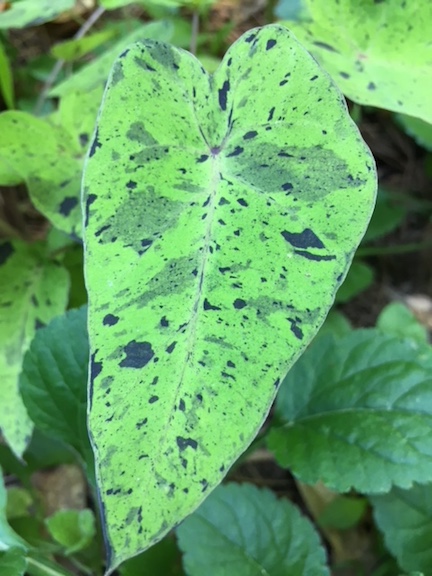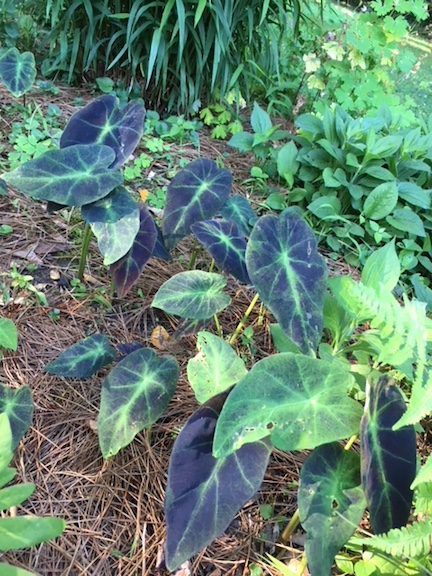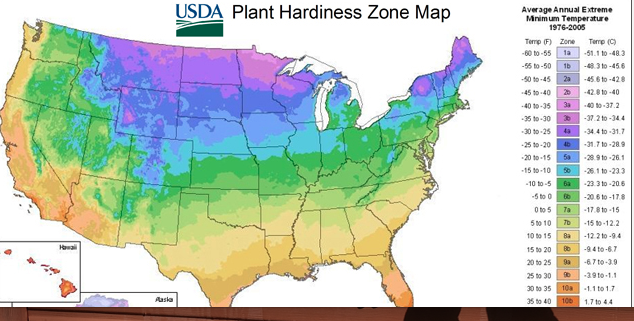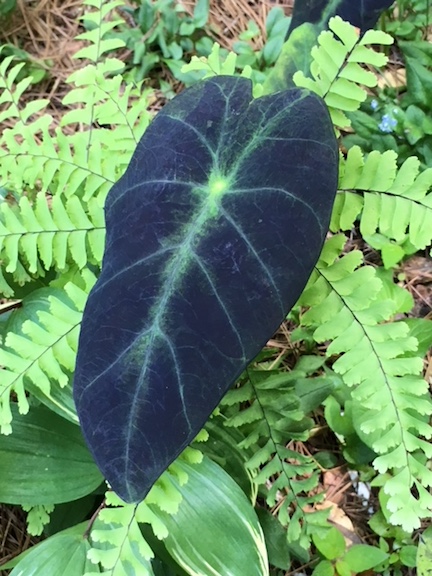There are hundreds of gardening books and thousands of gardening blogs. Information is abundant and accessible. But can you trust it all? Even this blog? In spite of my most sincere and energetic efforts, I’m sure that over 40 years of garden writing, I’ve made mistakes or stated unverified “facts.” It’s hard to know sometimes what is accurate or not and new information is always being uncovered. The truest and most reliable source is personal experience.

But when it comes to gardening, your “truest” experience and mine may be completely different because though gardening is a science, it is also an art and much depends on the “canvas” you are working with.
All of this came to mind when I was walking through my garden with a friend. When she saw an entire bed of elephant ears popping up, she stopped. “Did you just plant all those?” I grinned, “Nope, this is the fourth year they’ve come back.”

Being a relatively new gardener, she’s still more into the science than the art and said “But, they said elephant ears are annuals.” And she’s right. In Atlanta, Georgia and more northern regions, when you buy these big bulbs that produce stunningly large, interestingly marked leaves, the tags say “annual.” But, technically they are not.
Elephant ears are from the family Alocasias which originated in tropical areas of Southeast Asia. I planted the species Cococasia Esculenta illustris and, if you read the literature about this, it says that they are reliably hardy in horticultural zones 8 – 12. Atlanta is in growing zone 7b which means that really my elephant ears should not be coming back year after year. But if I’d paid attention to what “they” said, I would have missed out on 4 years of splendidly beautiful, dark, dark arrow shaped leaves and lots of fun. (If you want to know what your exact growing zone is – by zip code – click on the following link https://planthardiness.ars.usda.gov/PHZMWeb/)

Like many of our summer bedding plants (such as vinca and marigolds?) elephant ears are really tender perennials rather than annuals. The definition of an annual is a plant that completes its life span within a single year. A tender perennial, on the other hand, is a plant that originates in a warm climate and can live for years but is sensitive to or killed by cold temperatures. To make things easier in colder regions, nurseries and garden stores simply call them annuals.
Elephant ears fall into this category, but in the little pocket of ground in which I planted three bulbs four years ago, they some how survive. It’s not particularly sheltered and we have certainly had very cold weather the past few years, it’s just……magic. It’s a case where the books say it won’t happen, and it did.

On the other hand, the books also say that Swiss chard will “withstand heat” and that you can grow it throughout the summer. Hmmm, tell that to my Swiss chard which is wilting and bolting in spite of being well watered. So, the science tells me it will work, but I guess there’s dark magic in the gardening world as well.
For the most part, I believe in planting what’s appropriate for my growing region. Just because I’ve had good luck with elephant ears, it doesn’t mean that I’m going to try to make my garden a tropical paradise with palm trees and bananas. Especially as our weather patterns become more and more erratic, it’s better to keep the backbone of my garden plants that are reliably hardy for where I live.
I’m grateful for the body of knowledge about gardening that precedes me and hope that I am accurate and correct with the information that I add to it. But don’t believe everything you read, not even here. Try it yourself. Armed with common sense and a large measure of magic, no telling what you’ll discover!
And for my part, I’ll continue to spend as much time as possible in the garden, trying, experimenting, failing and succeeding and reporting back to you as accurately as possible. But mostly, I’ll just enjoy the magic.
Laura
P.S. I’m thrilled to announce that Nature Based now has an Etsy store. I’ve put many of my botanical designs on gifts and products and would love for you to check them out. http://www.naturebasedstore.etsy.com

